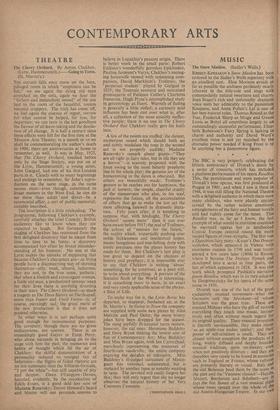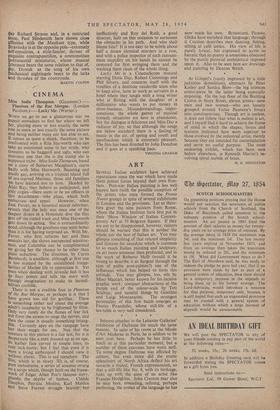MUSIC
The Snow Maiden. (Sadler's Wells.)
RimsKY-KoRSAKov'S Snow Maiden has been restored to the Sadler's Wells repertory with an excellent cast. Elsie Morison avoids as far as possible the archness perilously nearly inherent in the title-role and sings with commendably natural sweetness and charm. Joan Stuart's rich and unforcedly dramatic voice suits her admirably to the passionate Koupava, and Anna Pollak's Lel is one of her best travesti roles. Thomas Round as the Tsar, Frederick Sharp as Misgir and Gwent Lewis as Bobyl all contribute largely to an outstandingly successful performance. Elisa- beth Robinson's Fairy Spring is lacking in charm and authority and David Ward's excellent voice is not yet matched by the dramatic power needed if King Frost is to be anything but a pantomime figure.
The BBC is very properly celebrating the fiftieth anniversary of Dvorak's death by a series of concerts, which has included a platform performance of his opera Rusalka. This, the penultimate and most popular of Dvorak's nine operas, was first produced at Prague in 1901; and when I saw it there in 1946, it was still filling the National Theatre with a delighted audience in which there were many children, who were plainly uncon- cerned by the rather tedious emotional entanglements of the fairy and human worlds and had rightly come for the tunes. This Rusalka was, as far as 1 know, the last example of what would in maritime countries be mermaid operas but in landlocked Central Europe centred round the more insipid figures of river-nymphs. The first was a Danubian fairy story—Kauer's Des Donau- weibchen, which appeared in Vienna with enormous success in 1798 and was trans- ported a few years later (1804) to Russia, where it became The Dnieper Nymph and developed into a serial in four parts, the last of which appeared in 1824. It was this work which prompted Pushkin's narrative poem Rusalka, which was in its turn adapted by Dargomyzhsky for his opera of the same name in 1856. trRichard Strauss and, in a restricted nse, Paul Hindemith have shown close ffinu *ties with the Must/cant type, while travinsky is at the opposite pole—extremely , 1f-conscious, a style-fancier, deviser of Xquisite contrapunctilios, a cosmopolitan strumental miniaturist, whose musical tterance bears the same relation to that of, y, Dvorak as the song of his own echanical nightingale bears to the larks nd thrushes of the countryside.
MARTIN COOPER



































































 Previous page
Previous page